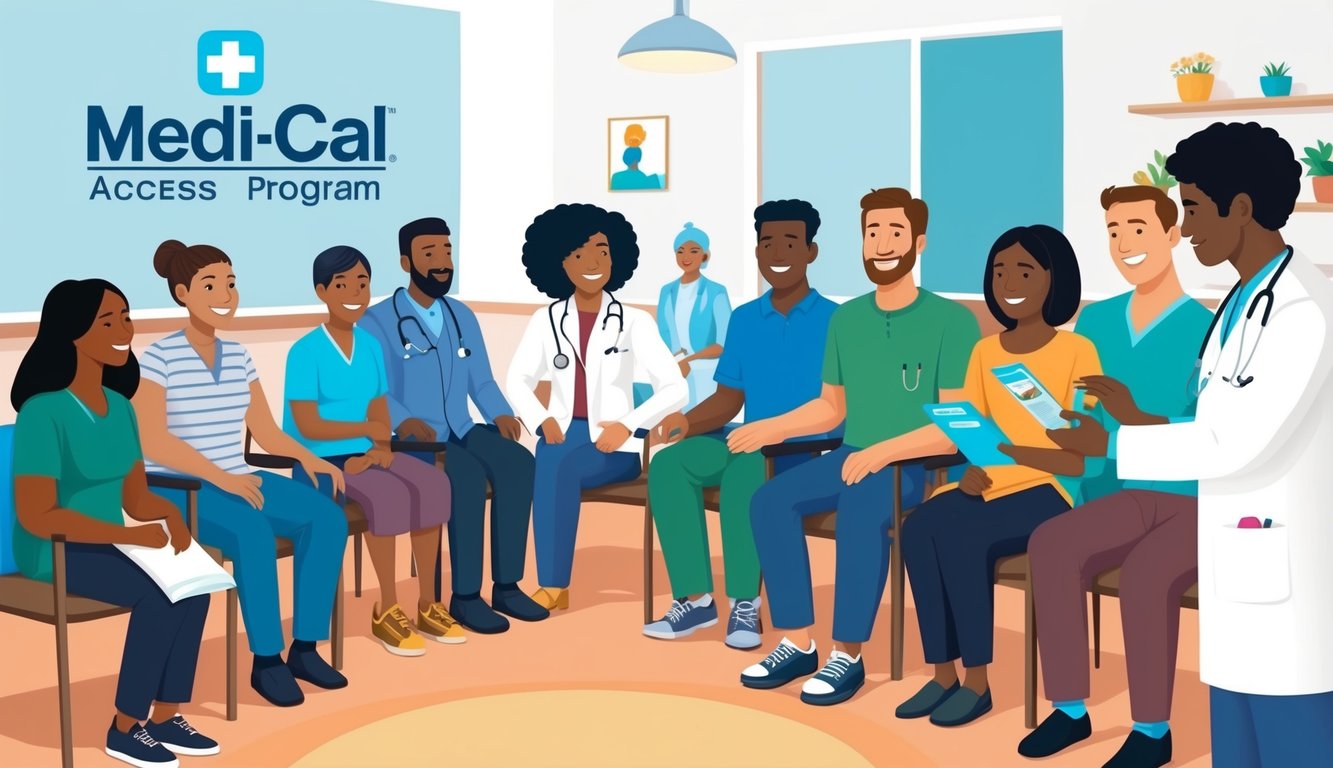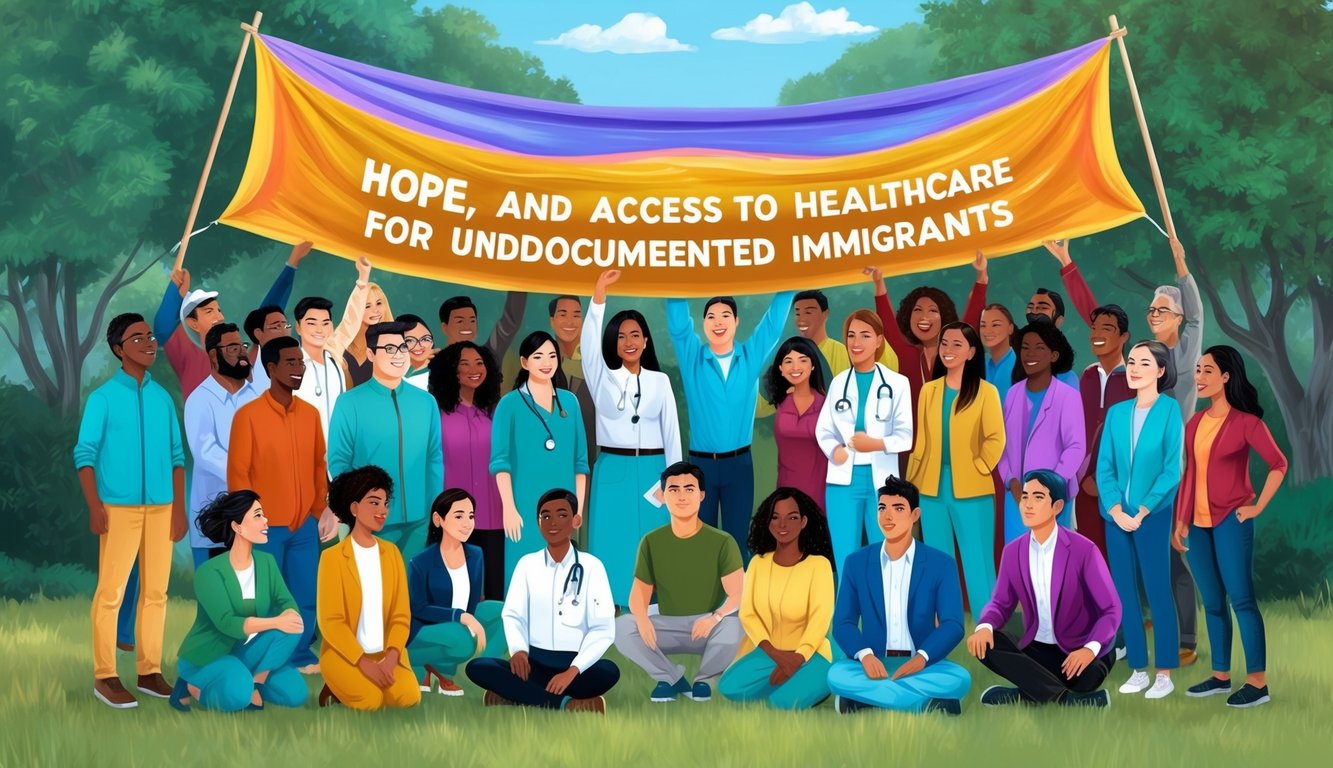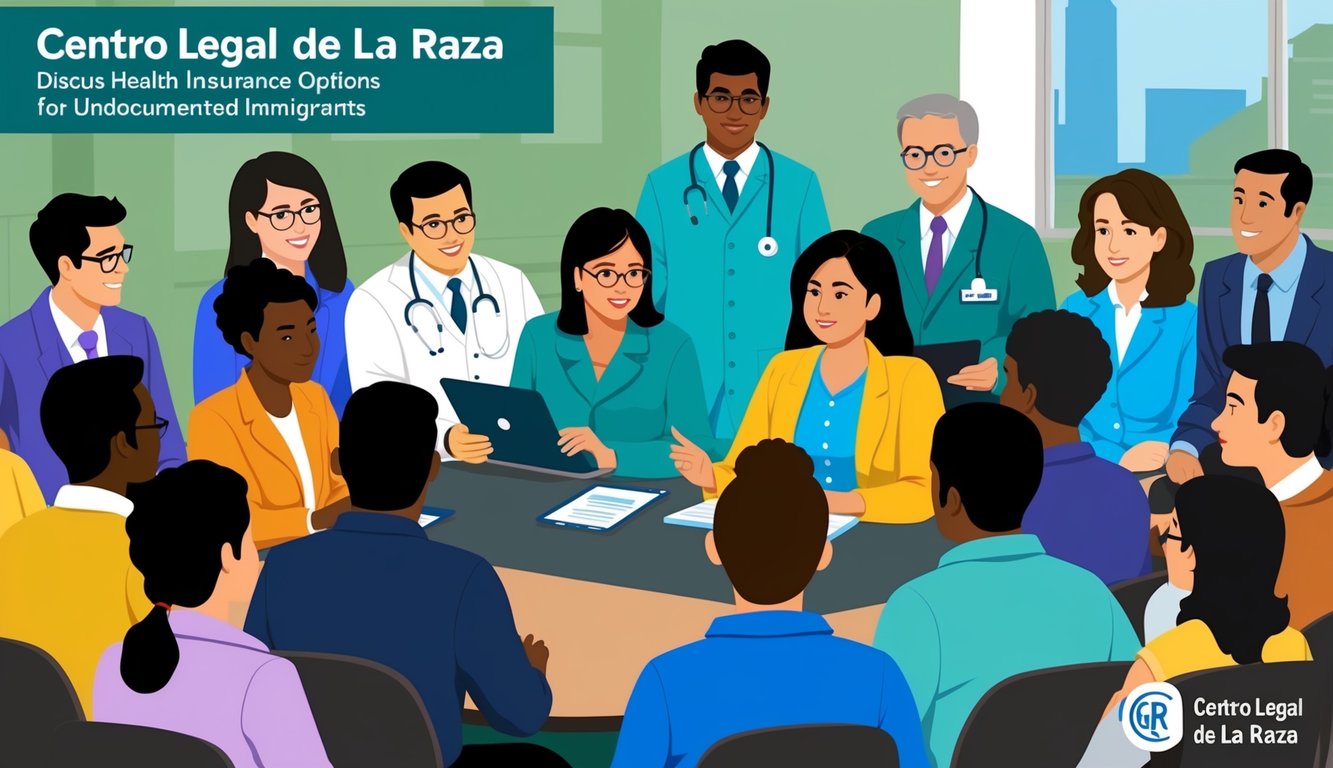Health insurance is a crucial aspect of healthcare access, providing financial protection and peace of mind.
For undocumented immigrants in the United States, obtaining suitable coverage can be challenging due to legal restrictions and limited options.
You have several potential avenues for health insurance as an undocumented immigrant, including private insurance, employer-sponsored plans, and state-specific programs. Understanding these options and their eligibility requirements is essential for making informed decisions about your healthcare coverage.
This article will explore the best health insurance choices available to undocumented immigrants, helping you navigate this complex landscape.
1) HealthSherpa
HealthSherpa offers valuable information for undocumented immigrants seeking health insurance.
While the platform primarily focuses on helping people enroll in Affordable Care Act (ACA) plans, it provides useful insights for those with various immigration statuses.
On HealthSherpa’s blog, you can find detailed articles about health insurance options for immigrants.
These resources explain the limitations and possibilities for coverage based on your specific situation.
If you’re an undocumented immigrant, HealthSherpa clarifies that you’re generally not eligible for ACA Marketplace plans or Medicaid.
However, they highlight exceptions and alternatives you might consider.
For instance, HealthSherpa mentions that some states offer expanded coverage options.
In California, low-income undocumented young adults can access Medi-Cal until age 26.
The platform also points out that you may be eligible for certain student health programs if you’re in school.
Additionally, HealthSherpa notes that private health insurance remains an option for undocumented immigrants, which can be obtained through employers or purchased directly from insurance companies.
While HealthSherpa doesn’t directly provide insurance for undocumented immigrants, its resources can help you understand your options and navigate the complex healthcare landscape in the United States.
2) My Undocumented Life
Living as an undocumented immigrant presents unique challenges when it comes to accessing healthcare.
You may feel uncertain about your options and hesitant to seek medical attention.
Despite these obstacles, it’s crucial to prioritize your health and well-being.
You have rights to healthcare access, regardless of your immigration status.
Many states are expanding coverage for undocumented immigrants.
For example, California has extended Medicaid coverage to young adults and older individuals regardless of immigration status.
You can explore private health insurance options through employers or the marketplace.
These plans are available to you without restrictions based on immigration status.
Community health centers and free clinics often provide care regardless of ability to pay or immigration status.
These can be valuable resources for routine and preventive care.
A new rule clarifies that receiving health benefits won’t negatively impact your immigration status.
3) Health For All

Some states are expanding healthcare access for undocumented immigrants through “Health For All” initiatives.
These programs aim to provide comprehensive health coverage regardless of immigration status.
California pioneered this approach with its Medi-Cal expansion to cover all low-income residents, including undocumented immigrants.
This move has set a precedent for other states to follow.
You may find similar programs emerging in states like Illinois, Oregon, and Massachusetts.
These initiatives typically offer state-funded health insurance to undocumented immigrants who meet certain income requirements.
The benefits of Health For All programs can be substantial.
They often include preventive care, prescription drug coverage, and access to specialists.
This comprehensive approach can lead to better health outcomes and reduced emergency room usage.
If you’re an undocumented immigrant, it’s worth checking if your state has implemented or is considering a Health For All program.
Eligibility criteria and covered services may vary by state.
Keep in mind that even in states without formal Health For All programs, you may still have options for healthcare access.
Community health centers and charity care programs often provide services regardless of immigration status.
While these programs represent progress, it’s important to note that coverage is not universal.
Many undocumented immigrants still face significant barriers to accessing healthcare in the United States.
4) Medi-Cal Access Program

Medi-Cal, California’s Medicaid program, has expanded to include undocumented immigrants of all ages.
This significant change took effect on January 1, 2024, making California the first state to offer health insurance to all undocumented immigrants.
If you’re an undocumented immigrant in California, you may now be eligible for Medi-Cal coverage.
This program provides comprehensive health insurance, including doctor visits, hospital care, preventive services, and prescription medications.
To qualify for Medi-Cal, you must meet certain income requirements.
The program is designed for low-income individuals and families.
You can apply for Medi-Cal at any time throughout the year.
Medi-Cal expansion has been implemented gradually over the years.
It started with coverage for undocumented children in 2015, followed by young adults up to age 25 in 2019, and adults 50 and older in 2022.
If you’re unsure about your eligibility or need assistance with the application process, you can seek help from local community health centers or social service organizations.
These resources can guide you through the enrollment process and answer any questions you may have.
Remember, accessing Medi-Cal will not affect your immigration status or be considered in public charge determinations.
The program aims to provide essential health coverage to all California residents, regardless of immigration status.
5) Healthy San Francisco
Healthy San Francisco is a program designed to provide health care services to uninsured residents of San Francisco.
If you’re an undocumented immigrant living in the city, this program may be a viable option for your health care needs.
To qualify for Healthy San Francisco, you must meet specific criteria.
You need to be a San Francisco resident, at least 18 years old, and uninsured.
Additionally, you should not be eligible for public insurance programs like Medi-Cal or Medicare.
The program covers a wide range of health services, including preventive care, emergency care, and specialty services.
It’s important to note that Healthy San Francisco is not insurance but rather a health access program.
If you’re interested in applying, you can contact Healthy San Francisco Customer Service for more information.
Their representatives are available Monday through Friday from 8:30 am to 5:30 pm.
Keep in mind that while Healthy San Francisco provides comprehensive care within the city, it may not cover services outside of San Francisco.
Therefore, it’s crucial to understand the limitations of the program before enrolling.
Healthy San Francisco aims to ensure that all residents, regardless of immigration status, have access to essential health care services.
This program can be a valuable resource if you’re an undocumented immigrant seeking health coverage in San Francisco.
6) New York State of Health

New York State of Health offers a new health insurance option for undocumented immigrants aged 65 and over.
This program began on January 1, 2024, providing coverage for seniors who previously had limited access to healthcare.
If you’re an undocumented immigrant over 65 living in New York, you can now apply for this insurance through the NY State of Health marketplace.
The application process is straightforward and can be completed online, by phone, or with the help of a navigator.
This new option aims to reduce the number of uninsured individuals in New York.
It’s part of the state’s efforts to expand healthcare access to all residents, regardless of immigration status.
The coverage provided is comprehensive, including essential health benefits.
You’ll have access to preventive care, prescription drugs, and hospital services.
This can significantly improve your health outcomes and reduce financial stress related to medical expenses.
To be eligible, you must be 65 or older, reside in New York State, and meet certain income requirements.
The NY State of Health website provides detailed information on eligibility criteria and how to apply.
Remember, your personal information is protected when you apply for this insurance.
The application process is confidential and won’t affect your immigration status.
7) Access to Cancer Care for Low-Income and Uninsured Patients
Cancer care can be challenging to access for low-income and uninsured patients.
If you fall into this category, you may face significant barriers to receiving proper treatment and support.
Uninsured cancer patients often face financial hardship.
Without insurance coverage, the costs of diagnosis, treatment, and follow-up care can be overwhelming.
You may be more likely to postpone or forgo necessary medical care due to financial concerns.
This delay can lead to later-stage cancer diagnoses, which often require more intensive and expensive treatments.
Fortunately, programs and resources are available to help. Social workers at cancer centers can assist you in finding financial aid and navigating the healthcare system.
Some organizations offer financial assistance specifically for cancer patients.
For example, the Leukemia & Lymphoma Society provides support for those with blood cancers.
You may also be eligible for Medicaid, especially if you live in a state that has expanded access to the program. Medicaid expansion has improved access to cancer care for many low-income adults.
While challenges remain, it’s important to know that options exist.
Reach out to healthcare providers, social workers, and patient advocacy groups to explore available resources and support for your cancer care needs.
8) County Medical Services Program

The County Medical Services Program (CMSP) is a vital resource for undocumented immigrants seeking health coverage in California.
This program provides health coverage for uninsured low-income, indigent adults who don’t qualify for other public health care programs.
CMSP operates in 35 primarily rural counties across California.
It offers a safety net for those who fall through the cracks of the traditional healthcare system.
To be eligible for CMSP, you must be a resident of a participating county and meet specific income requirements.
The program covers a wide range of medical services, including primary care, specialty care, and emergency services.
While CMSP is not specifically designed for undocumented immigrants, it doesn’t require proof of legal status.
This makes it accessible to many who might otherwise struggle to find health coverage.
You can apply for CMSP through your local county social services office.
The application process typically involves providing information about your income, residency, and household size.
It’s important to note that CMSP is not available in all California counties.
If you live in a non-participating county, you may need to explore other options for health coverage.
CMSP is governed by a board that sets program eligibility and policy direction.
This ensures the program remains responsive to the needs of the communities it serves.
9) Mexican American Opportunity Foundation

The Mexican American Opportunity Foundation (MAOF) offers valuable resources for undocumented immigrants seeking health insurance options.
This non-profit organization aims to improve the lives of Latino families through various programs and services.
MAOF provides assistance with health insurance enrollment for eligible individuals, including undocumented immigrants.
They can help you navigate the complex healthcare system and understand your options.
You can access information about low-cost clinics and community health centers through MAOF.
These facilities often provide care regardless of immigration status, making them crucial for undocumented individuals.
MAOF also offers educational programs to help you understand your healthcare rights and options.
They can guide you on how to access emergency medical services and other essential health resources.
While MAOF doesn’t provide health insurance directly, they can connect you with local programs and initiatives that offer coverage to undocumented immigrants.
Some states have expanded their health insurance options for this population, and MAOF can help you explore these possibilities.
Remember that MAOF’s services extend beyond healthcare.
They offer additional support in areas like education, employment, and social services, which can indirectly impact your overall health and well-being.
10) Centro Legal de la Raza

Centro Legal de la Raza is a legal services organization that advocates for immigrant rights, including access to healthcare.
They provide valuable resources and support for undocumented immigrants seeking health insurance options.
You can turn to Centro Legal de la Raza for guidance on navigating the complex healthcare landscape as an undocumented immigrant.
Their team of experienced attorneys and advocates can help you understand your rights and available options.
Centro Legal de la Raza offers legal assistance to immigrants facing barriers to healthcare access.
They can provide information on local programs and initiatives that extend health coverage to undocumented individuals.
If you’re struggling to find affordable healthcare options, Centro Legal de la Raza may be able to connect you with community clinics or other low-cost providers.
They work to ensure that undocumented immigrants can access essential medical services.
While not an insurance provider itself, Centro Legal de la Raza plays a crucial role in advocating for expanded healthcare access.
They work to challenge policies that exclude undocumented immigrants from health insurance programs.
You can reach out to Centro Legal de la Raza for information on your eligibility for various health programs.
They stay up-to-date on changing laws and policies affecting immigrant healthcare access.
Nonprofit Organizations
Numerous nonprofit organizations offer financial assistance and healthcare services to undocumented immigrants.
These groups often provide free or low-cost medical care, dental services, and mental health support.
Some organizations focus on specific health issues, such as reproductive health or chronic diseases.
Others offer general medical services and help navigate the healthcare system.
You can find these organizations through local immigrant advocacy groups or online directories.
Many partner with healthcare providers to offer discounted services or help cover medical expenses.
Make sure to reach out to multiple organizations, as each may have different eligibility requirements and available resources.
Some may also provide assistance in applying for emergency Medicaid or other public health programs you might qualify for.






